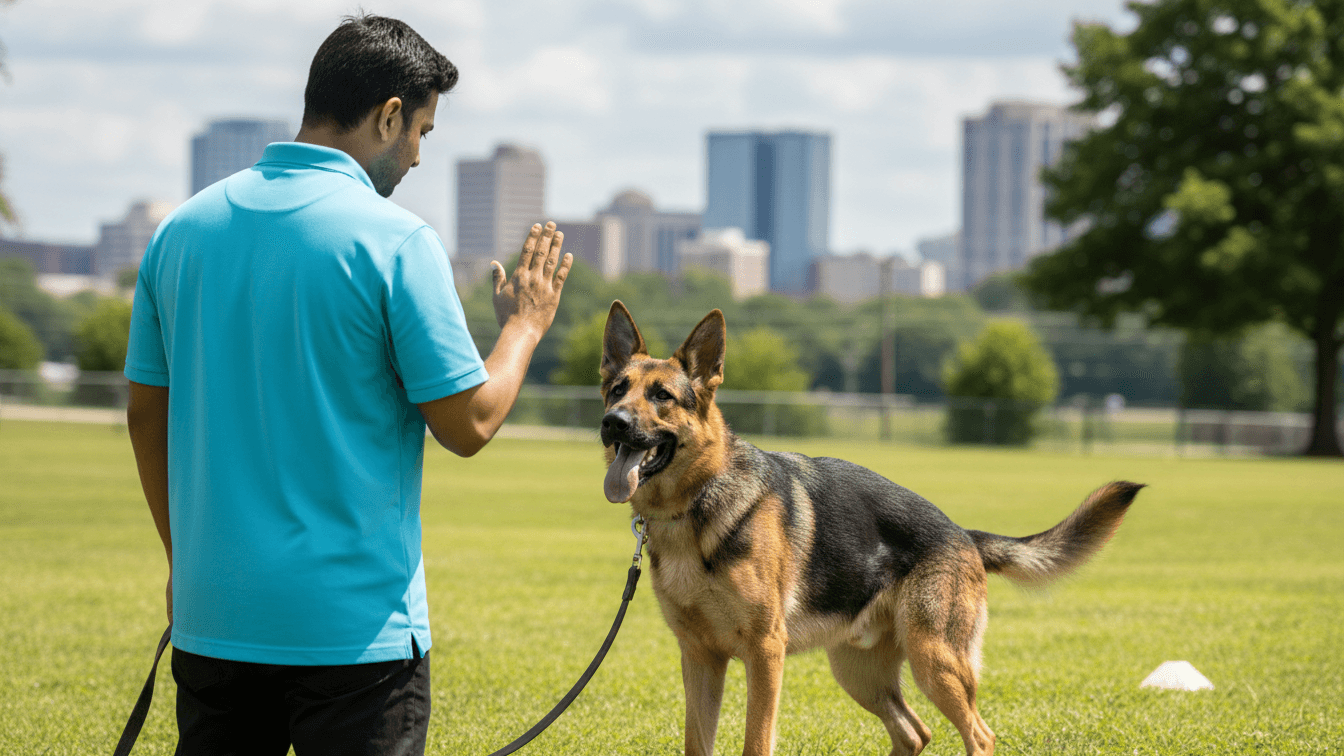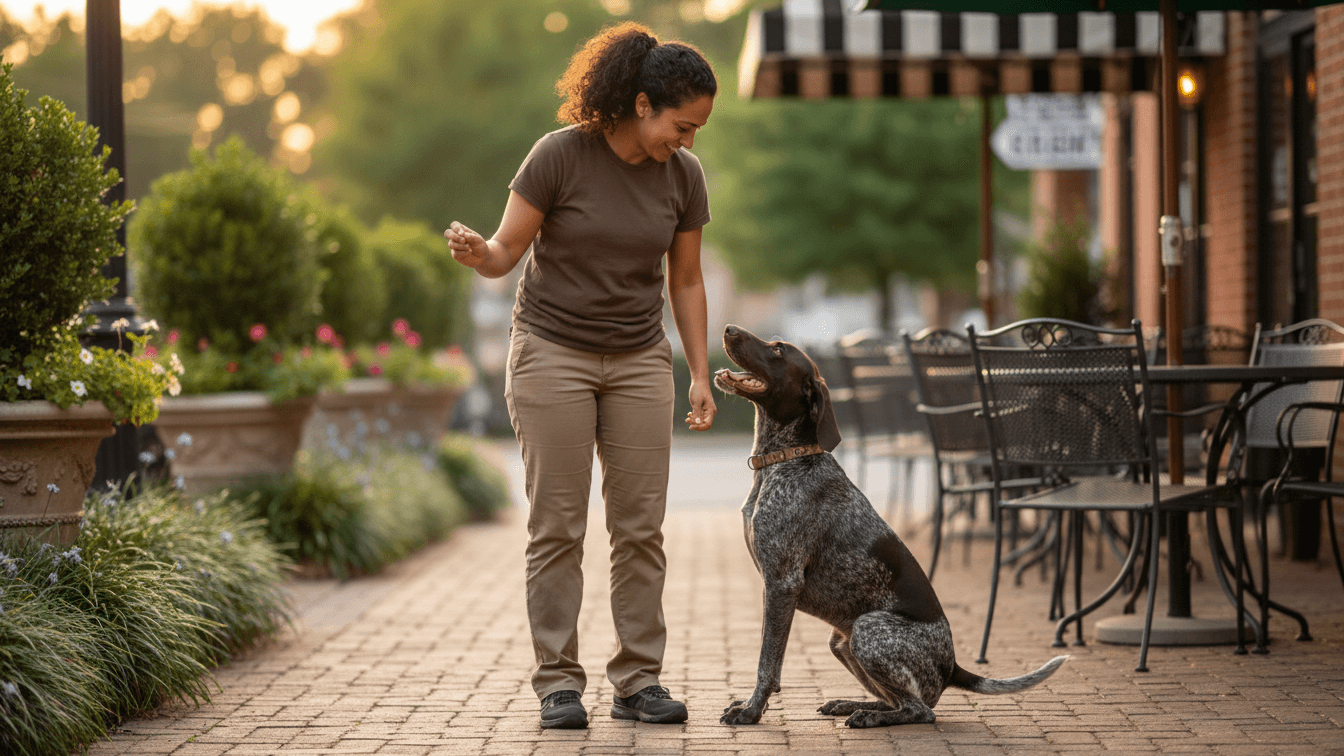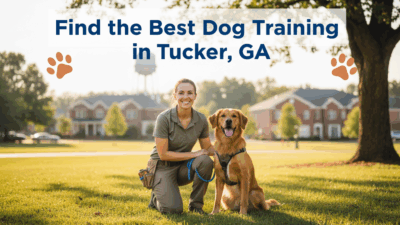Your Complete Guide to Choosing a Dog Trainer in Tucker, GA and Surrounding Areas
Living with a dog in Tucker means navigating bustling Main Street, visiting local parks, and handling everyday life in this vibrant DeKalb County community. Your dog needs to stay calm during walks past the popular restaurants near Main Street and Henderson Road, behave politely when you run errands at Tucker Farmers Market, and handle the energy of local events without pulling or jumping.
Tucker sits in DeKalb County, so you’ll follow county ordinances alongside city rules. Finding a professional dog trainer who understands these local details makes a real difference in how well your training program translates to everyday life.
How to Choose the Right Trainer
Start by looking for someone who focuses on positive reinforcement training and can build a plan around your Tucker lifestyle. This means your dog should learn to walk calmly through Henderson Park, stay focused near kids at playgrounds, and handle trips to the vet without stress.
Credentials help you compare trainers quickly and gauge their expertise. Common dog trainer certifications include KPA-CTP, CPDT-KA, or IAABC-CDBC for behavior issues. If your dog shows serious aggression or fear, look for someone with CBCC-KA or a structured science-based program like CTC.
In-home dog training works great for puppy training, fixing door manners, and practicing leash skills right in your Tucker neighborhood. Group classes make sense once your dog can focus around distractions, especially before heading to busier spots like the parks or downtown Tucker.
Ask about training sessions that match your schedule and goals. Some trainers offer board and train programs if you need faster results, while others focus on private lessons that give you one-on-one attention.
Common Dog Training Methods Explained
Reward-based methods create lasting behavior changes while building the trust you want with your dog. They also help you meet DeKalb County’s requirements for keeping dogs under control in public spaces.
Basic obedience covers sit, down, stay, place, recall, and leash training so your dog can handle walks, outdoor dining areas, and park visits without pulling or jumping on strangers. These skills form the foundation for everything else.
Puppy classes focus on socialization, potty training, bite control, crate comfort, and early leash manners. Starting young with positive methods prevents bad habits before they take root.
Behavior modification addresses fear, reactivity, resource guarding, or separation anxiety through careful desensitization and counterconditioning. For serious cases, ask if your trainer coordinates with local veterinarians who understand behavior issues.
Private lessons and in-home sessions let you customize everything around your daily routines and specific home challenges. Day training can speed up progress when you’re short on time, with the trainer working your dog during the day and then teaching you how to maintain the results.
Dog training classes help your dog practice good manners around other dogs and people in controlled settings. The best group classes screen participants carefully, give dogs enough space, and teach calm behavior rather than just excitement.
Specialized training like service dog training or therapy dog training requires extra structure, public-access skills, and a clear step-by-step plan. Make sure any trainer offering these programs has experience with the specific certification requirements.
Stay away from trainers who rely on fear, intimidation, or pain to get results. Humane methods are safer for everyone, easier to maintain long-term, and much better for keeping peace with your Tucker neighbors.
Average Cost of Dog Training in Tucker, GA (Updated for 2025)

Prices around Tucker and DeKalb County depend on the trainer’s experience, session length, and where the training happens. Here’s what most local dog owners are paying in 2025.
| Service Type | Average Cost (Tucker/DeKalb County) |
|---|---|
| Puppy classes (4-6 weeks) | $140-$260 total |
| Group obedience classes (4-6 weeks) | $155-$285 total |
| Private lessons (60-90 min) | $100-$180 per session |
| In-home coaching packages (4-6 visits) | $400-$875 total |
| Day training (trainer works your dog + handoff) | $425-$925 per week |
| Behavior consult for reactivity/anxiety (initial) | $145-$240 |
| Board and train (2-4 weeks) | $1,900-$4,300 total |
You might pay extra travel fees if you’re on the outer edges of DeKalb County, and expect higher rates for complex behavior work like aggression or severe anxiety.
Make sure you understand what’s included in each package, how the trainer tracks progress, and whether they offer a free consultation before you commit to a training program.
Questions to Ask a Potential Dog Trainer
- What training methods do you use, and how do you keep training sessions positive and low-stress?
- What credentials do you have, like KPA-CTP or CPDT-KA? Do you keep up with continuing education such as CPDT-KSA?
- How will you customize the plan for my dog’s specific needs and our Tucker lifestyle?
- Do you offer in-home visits, dog training classes, or day training, and which approach fits my goals best?
- How will we measure my dog’s progress and know when to add more distractions?
- What are the total costs, including any travel fees, and what’s your cancellation policy?
- Do you carry liability insurance, and can you show me proof?
- For behavior problems, will you work with my veterinarian if needed?
- What should I practice between sessions to help your dog keep improving?
- Do you offer a free evaluation so we can meet before committing?
Local Tucker and DeKalb County Rules and Considerations
Tucker and DeKalb County enforce leash laws and nuisance rules to keep parks and neighborhoods safe. Georgia state law also sets requirements for rabies vaccination and animal control.
Leashes are required in all public spaces except inside designated off-leash dog parks. Keep a standard 6-foot leash with you for Tucker greenways, parks, and community events.
Georgia law requires current rabies vaccination for all dogs, and DeKalb County enforces this through licensing requirements. You’ll need to register your dog with the county and keep the tag on their collar at all times.
DeKalb County Animal Services handles licensing, lost pets, and animal control issues. You can find more information on their website about requirements and resources.
Excessive barking can be considered a nuisance under county ordinances, so work with your dog trainer on alert barking and separation anxiety before neighbors file complaints. If your trainer wants to use city parks for commercial dog training services, they may need permits and proof of insurance from the city.
Georgia doesn’t require special licenses for dog trainers, but any facility that boards dogs for payment needs to follow state regulations. The Georgia Department of Agriculture oversees kennel licensing and animal welfare standards.
Local Tucker Resources for Dog Owners
These spots give you great places to practice polite manners, work on recalls, and provide safe enrichment for your well-behaved dog. Always follow posted rules and practice good dog park etiquette.
- Tucker Recreation Center Dog Park offers fenced areas where you can safely practice off-leash recall and socialization during quieter hours.
- Henderson Park provides open green spaces perfect for leash training and practicing focus around families and other activities.
- Kelley Cofer Park features walking paths and open areas where you can work on loose-leash walking and basic obedience commands.

FAQs
How much does in-home dog training cost?
Most Tucker trainers charge $100-$180 per in-home visit, with package discounts available when you buy multiple sessions. Behavior modification for reactivity or aggression typically starts at the higher end of that range.
Is in-home dog training worth it?
Absolutely, because you’re addressing problems exactly where they happen. Your trainer can fix door manners, jumping on guests, counter-surfing, and yard reactivity right at home, then step outside to practice leash skills on your actual Tucker streets and sidewalks.
Can you pay someone to house train your dog?
Yes, many expert dog trainers offer puppy programs that include potty training, crate routines, and daily schedules. Day training can speed up the process while teaching you how to maintain the progress on your own.
What is the 3-3-3 rule for dog training?
This timeline helps with new or adopted dogs: expect about 3 days for your dog to decompress, 3 weeks to learn your routines, and 3 months to feel completely settled. Good training programs work with this natural adjustment period rather than against it.
How long will it take to reach my training goals?
Most puppies and friendly adult dogs show solid progress within 4-8 weeks if you practice daily. Fear, reactivity, or aggressive dog training typically requires several months of careful behavior modification with gradual increases in difficulty and distractions.
What should I bring to group classes?
Pack a flat collar or harness, a 6-foot leash, high-value treats, water, and current vaccination records if your trainer requests them. Leave retractable leashes at home for safety reasons.
What’s the leash law in Tucker?
Dogs must be leashed and under control in all public areas, except inside designated off-leash dog parks. Keep that 6-foot leash handy for Tucker parks, downtown areas, and community events.
Do I need a dog license in Tucker or DeKalb County?
Yes, DeKalb County requires dog licenses for all dogs over three months old. You’ll need proof of current rabies vaccination to register, and the license must be renewed annually. Contact DeKalb County Animal Services for details.
What shots does my dog need in DeKalb County or Georgia?
Rabies vaccination is required by Georgia state law for all dogs. Your veterinarian may also recommend distemper-parvo and bordetella based on your dog’s lifestyle and exposure to other dogs in training classes or parks.
Are dog trainers required to be licensed in Tucker or DeKalb County or Georgia?
No special trainer licenses exist in Georgia for dog obedience training. Trainers follow normal business regulations, but if they offer board and train services, their facility may need to be licensed as a boarding kennel under Georgia Department of Agriculture regulations.
Where can I practice off-leash recall?
Use the fenced dog park at Tucker Recreation Center to keep things safe and legal. Try visiting during quieter hours when you’re starting out with recall training for dogs.
Which dog parks allow training around Tucker?
Tucker Recreation Center Dog Park allows off-leash practice within its fenced areas. Always check posted rules and practice good etiquette by keeping sessions short during busy times so other dogs can enjoy the space too.
What trails allow dogs for training?
Henderson Park and Kelley Cofer Park both welcome leashed dogs on their trails and open spaces. These locations are perfect for teaching calm focus around joggers, families, and other dogs while building your dog’s confidence in different environments.
How do I find a certified dog trainer in Tucker?
Look for trainers with credentials from recognized organizations and ask about their experience with your specific training needs. Many certified trainers offer a free consultation so you can meet them and discuss your goals before committing to a program.
What if my dog has separation anxiety?
Work with a trainer experienced in behavior modification who can create a gradual desensitization plan. Separation anxiety often requires several months of consistent work, and in some cases, your trainer may recommend working with a veterinary behaviorist alongside your training program.
The right combination of thoughtful planning, humane methods, and consistent practice around Tucker’s parks and neighborhoods will help your dog become a confident, well-behaved companion. If credentials matter to you, don’t hesitate to ask about dog trainer certifications and how your trainer stays current with new techniques.
